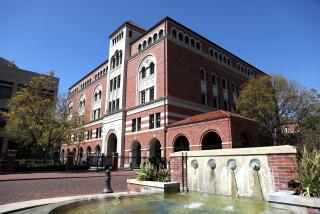King Widow Can Sue for His Documents, Judge Rules
- Share via
BOSTON — Coretta Scott King can sue Boston University for thousands of documents her late husband gave the school, but she will have to explain why she waited two decades before pursuing her claim, a judge has ruled.
In a ruling made public Thursday, Suffolk Superior Court Judge John L. Murphy Jr. said a 1964 letter by slain civil rights leader Dr. Martin Luther King Jr. bequeathing the papers to the university is not a formal will. Therefore, he said, King’s widow has the right to a trial on her claim to the material.
Murphy’s decision set no trial date. James F. O’Brien, an attorney representing Mrs. King, said he was pleased with the ruling and would file a motion soon requesting a trial. Attorneys for Boston University were not available for comment.
Mrs. King claims that the collection of 83,000 documents held by the university should be stored in the Martin Luther King Jr. Center for Nonviolent Social Change in Atlanta, where 100,000 other King documents are housed.
After negotiations with the university broke down, Mrs. King sued in December.
In his ruling, Murphy said a key issue in the trial would be whether Mrs. King’s delay of more than 20 years in making a claim strengthens the university’s case.
The trial will have to determine “whether the 23-year delay in instituting this action was unreasonable and resulted in some injury or prejudice to” the university, the judge wrote.
O’Brien said he was confident that the question of any harm to the university in the delayed filing of the claim can be easily handled. “Boston University has not been harmed in any way. It’s actually benefited by having the papers all this time,” he said.
In a one-page, typewritten letter to the university library dated July 16, 1964, King wrote: “In the event of my death, all such materials deposited with the university shall become from that date the absolute property of Boston University.”
King received a doctorate in theology from the school in 1955. He was assassinated in Memphis, Tenn., in 1968.
More to Read
Sign up for Essential California
The most important California stories and recommendations in your inbox every morning.
You may occasionally receive promotional content from the Los Angeles Times.












